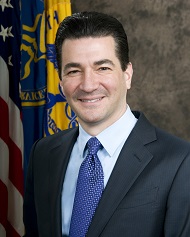The outgoing Food and Drug Administration (FDA) commissioner Scott Gottlieb, MD, has said his departure won’t have any impact on the agency’s crackdown on youth vaping, according to a story by Jessie Hellmann at thehill.com.
“I’m very confident of that, and I’m very confident that we’re going to continue with this policy over the next month, including the policy that we’ve been formulating,” Gottlieb was quoted as saying during an event hosted by The Hill on Wednesday.
Hellmann wrote that Gottlieb had proposed limiting the sales of most flavored electronic cigarettes to age-restricted, in-person locations, effectively ending sales at gas stations and convenience stores.
“I think there is widespread recognition that this is a major public health crisis,” Gottlieb said. “I think for the vaping community and the tobacco industry this is an existential threat.
“I don’t think they fully appreciate what they’re facing and the tsunami that they’re facing if we don’t get this under control.
According to the story at The Hill quoting FDA data, there was a 78 percent increase in e-cigarette use among US high school students from 2017 to 2018, and a 48 percent increase among middle school students.
Gottlieb’s actions have been questioned by some people who argue the proposed changes would make it harder for adults who are trying to quit smoking to get e-cigarettes as an alternative.
But Gottlieb seemed not to buy that argument.
“I think the arguments that the folks who are advocating a completely laissez-faire hands-off approach with respect to vaping don’t hold true,” he was quoted as saying.
“We’re catching the beginning of an epidemic.”










